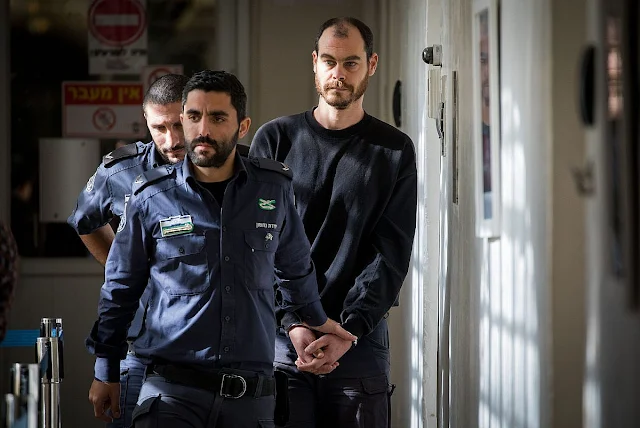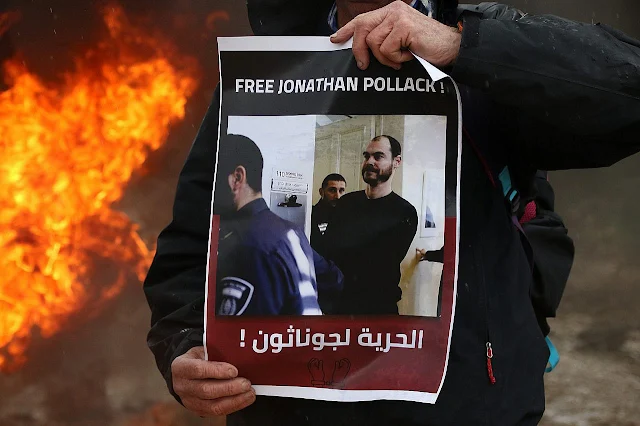L’attentat qui a détruit les bureaux de l'ONG danoise Global Aktion à Copenhague le lundi 13 janvier 2025 est un acte extrêmement grave : c'est à notre connaissance la première fois que les partisans de l’occupation marocaine du Sahara occidental recourent à des méthodes d'une telle violence sur le territoire européen. Est-ce le début d’une campagne organisée visant les défenseurs du peuple sahraoui à travers l'Europe et le monde ? On peut le craindre. En attendant, voici les informations dont nous disposons à ce jour.-SOLIDMAR
Le bureau d’une ONG attaqué au Danemark pour son travail avec le peuple sahraoui : « Ils ne nous feront pas taire »
Francisco Carrión, El Independiente, 14/1/2025
Traduit
par Tafsut Aït Baâmrane,
Tlaxcala
« Le Sahara appartient au Maroc « ou “Arrêtez de soutenir le terrorisme”. Ce sont les graffitis laissés par l’attaque du bureau de l’ONG danoise Global Aktion à Copenhague pour son travail d’assistance au peuple sahraoui et de dénonciation de l’occupation marocaine de l’ancienne colonie espagnole. La direction de l’ONG a dénoncé « une attaque sans précédent » sur le sol danois.
« Il s’agit d’une escalade sans précédent d’un conflit politique, utilisant des méthodes que nous n’avons pas vues au Danemark depuis des décennies », a déclaré Morten Nielsen, responsable de la politique et des campagnes de Global Aktion. Le bureau de l’ONG a été attaqué tôt lundi matin et entièrement brûlé. « Il est fort probable qu’une bombe incendiaire ait été lancée à travers une fenêtre, brûlant et endommageant tous nos biens », a déclaré le groupe dans un communiqué.
« Une tentative d’arrêter notre travail »
Selon les responsables, « le message était sans équivoque ». « Nous y voyons une tentative claire d’arrêter notre travail pour les droits humains, la liberté et l’opposition à l’occupation brutale du Sahara occidental par le Maroc », disent-ils. Sur ses médias sociaux, l’ONG assure que l’attaque « ne les fera pas taire ». « « Nous soutenons leurs demandes d’indépendance et de décolonisation. Mais nous sommes profondément choqués par ce qui s’est passé la nuit dernière. Nous n’avons jamais imaginé que quelqu’un pourrait intensifier les attaques contre nous d’une manière qui mettrait nos vies en danger. C’est tout à fait inacceptable et nous espérons que l’affaire sera résolue de manière approfondie », admettent-ils.
Global Aktion souligne que les auteurs ne parviendront pas à « affaiblir le mouvement de solidarité mondiale pour le Sahara occidental ». « Cela ne fait que souligner l’importance de rester unis. Un exemple de ce que nos camarades au Sahara Occidental vivent au quotidien. L’attaque contre notre organisation nous oblige à reconsidérer la façon dont nous mènerons notre travail politique à l’avenir, afin d’assurer la sécurité de nos militants. En même temps, elle souligne le besoin urgent de notre voix et notre forte solidarité avec la lutte du peuple sahraoui contre l’occupation ».
« Le feu et la fumée ne nous feront pas taire. Nos pensées et notre solidarité vont au peuple du Sahara occidental occupé et aux camps de réfugiés qui, depuis 50 ans, luttent chaque jour pour les droits humains, la justice et la décolonisation. Ce que nous vivons aujourd’hui ne peut être comparé à l’oppression que le peuple du Sahara Occidental subit depuis 50 ans », affirment-ils.
L’ONG dénonce également la connivence des pays de l’Union européenne avec le Maroc dans une conjoncture marquée par l’annulation par la Cour de justice de l’UE des accords agricoles et de pêche entre Bruxelles et Rabat pour avoir ignoré les droits du peuple sahraoui.
Le Polisario accuse le Maroc
Le Front Polisario a condamné « l’attentat atroce qui a visé les bureaux de Global Aktion au Danemark, où les flammes ont englouti son siège et des graffitis ignobles ont souillé ses locaux avec des messages incitant à la haine contre le peuple sahraoui, ce qui représente une attaque directe contre les valeurs de la justice, de la liberté et de la solidarité internationale ». Par la voix de sa représentation à Bruxelles, le Polisario considère qu’il s’agit d’une « tentative délibérée de faire taire les voix de ceux qui osent contester l’occupation illégale du Sahara occidental par le Maroc et dénoncer ses violations flagrantes des droits humains » et qui s’inscrit dans « un contexte plus large de campagne systématique du Maroc pour réprimer la dissidence et éliminer toute forme de résistance à ses ambitions coloniales ».
« Dans les territoires occupés du Sahara occidental, le régime marocain a employé des mesures brutales pendant des décennies, y compris le meurtre de civils sahraouis, les arrestations arbitraires, les disparitions forcées et la torture des défenseurs des droits humains. Ces méthodes de répression ont maintenant été étendues pour cibler les mouvements de solidarité internationale, alors que le Maroc cherche à exporter sa campagne d’intimidation et de violence au-delà des frontières du Sahara occidental », déplorent-ils.
« L’attaque à la bombe incendiaire contre Global Aktion est un rappel brutal des limites que le Maroc est prêt à franchir pour maintenir son occupation illégale et étouffer le soutien mondial croissant à la cause sahraouie. Cet acte criminel est emblématique d’un régime qui a constamment montré son mépris pour le droit international et les droits humains, encouragé par le silence et la complicité de certains acteurs puissants sur la scène mondiale », concluent-ils.
Lire aussi Incendie des bureaux d’un partenaire de WSRW
Asria Mohamed après l’attentat de Copenhague : « Cet attentat est la preuve que notre travail est important »
Héctor Bukhari Santorum, Nueva Révolución, 15/01/2025
Traduit
par Tafsut Aït Baâmrane,
Tlaxcala
L’attaque contre les bureaux de Global Aktion à Copenhague n’était pas seulement un acte de vandalisme, c’était une attaque délibérée contre ceux qui défendent la liberté et les droits humains du peuple sahraoui. En plus de la destruction des locaux de Global Aktion, l’attaque visait aussi directement la délégation du Front Polisario au Danemark, le représentant légitime du peuple du Sahara occidental.
« Il ne s’agit pas simplement d’une agression de plus », ont déclaré les militants après l’incident. C’est une attaque directe contre le seul représentant du peuple sahraoui, le Front Polisario, qui partage le bâtiment avec Global Aktion. Cela montre jusqu’où les ennemis de l’autodétermination sont prêts à aller pour faire taire notre lutte.
À la suite de l’attaque, l’activiste sahraouie Asria Mohamed Taleb a publié un message plein d’indignation. « L’attaque d’hier n’était pas seulement une attaque contre un bureau, c’était une attaque contre les principes que nous défendons : les droits humains, la liberté et la justice pour le peuple du Sahara occidental. Cette attaque est la preuve que votre travail compte, que votre travail est visible, et qu’il met nos ennemis mal à l’aise », a déclaré Mohamed.
Dans son intervention, l’activiste a rappelé les 50 années d’occupation marocaine, marquées par l’oppression et les violations systématiques des droits humains, et a souligné comment le travail d’organisations telles que Global Aktion a permis à la cause sahraouie d’atteindre un public international.
La plus grande mobilisation pro-sahraouie de l’histoire du Danemark
Au lendemain de l’attentat, le Danemark a connu une mobilisation sans précédent. Hier mardi 14 janvier, la plus grande manifestation pro-Sahara occidental jamais enregistrée dans le pays a eu lieu.
Des centaines de personnes ont rempli les rues en scandant des messages tels que « L’occupation doit cesser », montrant clairement que la lutte pour l’autodétermination du Sahara Occidental n’est pas seule.
« Lorsque les gouvernements privilégient leurs intérêts politiques au détriment du respect du droit international, c’est la société civile qui doit faire entendre sa voix », a souligné Asria Mohamed. Cet événement massif n’a pas seulement montré la solidarité, mais aussi que le message gagne du terrain dans l’opinion publique.
Malgré les tentatives d’intimidation, la récente mobilisation est le signe que la cause sahraouie est plus vivante que jamais. « Aujourd’hui plus que jamais, notre voix résonne fort. Nous n’abandonnerons pas », a conclu Asria Mohamed.
➤Déclarations de solidarité à travers le monde
NdlT
Suite à l’attentat, la police a interpellé deux membres d’un gang
criminel du quartier de Nørrebro, déclaré illégal par la justice danoise
en 2018. Appelé Loyal to Familia, le gang a été créé en 2013 par Shuaib
Khan - condamné plus tard à 8 ans de prison pour meurtre - et a été l’un des
protagonistes de la guerre des bandes qui a ensanglanté les rues de Copenhague [pour le contrôle du trafice de drogue] en 2017. Le nombre de ses membres, qui avait atteint 225 en 2018, a baissé à
une centaine en 2021. Après l’emprisonnement de Khan, deux frères marocains
natifs de Nørrebro et mêlés à une longue
série d’actions criminelles ont tenté de prendre la direction de la bande :
Abderrazak et Abdessamad Benarabe. Le premier, surnommé « Grand A »,
a défrayé la chronique danoise, entre autres pour avoir combattu dans les rangs
du groupe djihadiste Ahrar El Sham à Idlib en Syrie. Nous ignorons leurs faits
et gestes récents.











